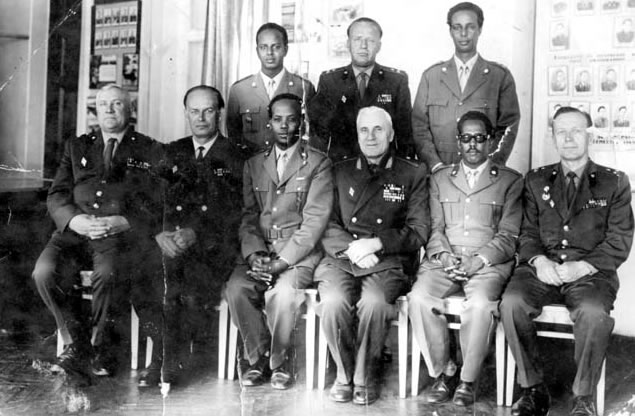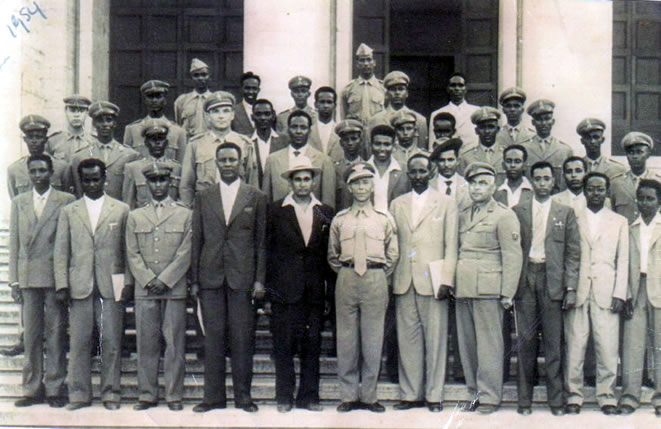
A group photo in Leningrad in 1968. Seated military officers are Colonel Doonyaale (at the left), Hassan Farah Matan (the man in the spectacles was a graduate from Sandhurst military academy in Britain; currently living in Dubai) and Soviet Tutors (all are Generals). Standing are Mohamed Aalim, the late Hassan Mohamud Roble and one of their Soviet tutors.
Mohamed Haji (Ingiriis)
Saturday, May 21, 2011
Colonel Ibrahim Rooble Warfaa “Doonyaale” was one of the greatest military leaders in post-independence Somalia. Born in an area between Harardheere and Ada-Kibir – a locality of Adado town in central Somalia – he raised in Eelbuur where his talent surfaced beneath the surface. Soon he emerged to be a self-trained swimmer and trainer.
During the rainy seasons of the 1940s, the city of Eelbuur was known to be carved into two separate quarters by torrential floods. According to some of his peers in the military, the rationale of why Doonyaale was nicknamed ‘Doonyaale’ was his invention of an archaic boat in Eelbuur at the age of 13 in order to craft access to cross the deluge.1
In 1954, Doonyaale enlisted in the first group of Somali cadets to be taken to Italy for military training. Pointing out to their last military ranks, the cadets, consisted of 14 young officers, were:
1. Colonel Mohamed Nuur Mohamed “Baarqab”.
2. Colonel Elmi Nuur Tarambi.
3. Colonel Ibraahim Rooble Warfaa “Doonyaale”.
4. Colonel Hassan Mohamed Sabriye “Gaamuur”.
5. Colonel Abdullahi Yusuf Ahmed.
6. Colonel Abuukar Gacal Muudeey.
7. Lieutenant General Mohamed Ali Samatar.
8. Brigadier General Mohamed Farah Aideed.
9. Brigadier General Salaad Gabeyre Kediye.
10. Brigadier General Abuukar Xasan Weheliye “Suulaleey”.
11. Major General Cabdalla Mohamed Faadil.
12. Brigadier General Mohamed Jama Xarbi.
13. Brigadier General Nuur Addow Ali.
14. Brigadier General Mohamed Ali Mohamed “Sharmaan”.
Upon three years of military training, Doonyaale and his group returned to Mogadishu in the summer of 1957, travelling by ship from Italy2. In July 1960, General Daa’uud Abdulle Hersi, the father of Somali Armed Forces, instructed Doonyaale to conduct an examination of new Somali cadets to be enlisted in the army. In his close scrutiny - with the help of Salad Gabeyre - Doonyaale selected below officers to be taken to Italy for military training (I point out to their last military ranks as well):
1. Colonel Aweys Jeylaani (a man from Hamarweyne neighbourhood of Mogadishu; he was a number one at that examination). He is now a well-known businessman in Mombasa, Kenya.
2. Lt Colonel Mohamed Ismail Ibrahim known as Sera Sera Sete (777). He currently lives in both Manchester, the UK and Germany3.
3. Colonel Mohamed Ahmed Aalim. He later became Ambassador to Pakistan, currently living in London4.
4. Colonel Hassan Mohamud Roble “Hassan Dheere”. He passed away in Kampala, Uganda, in peacefully.
5. Colonel Mohamed Hassan Barre Tooxow. He was assassinated during the time of Barre.
6. Captain Mohamud Ali Hawiye known as ‘Mohamud Ga’amey’. He once was deputy of Salad Gabeyre in the Military Operations Command. In 1969, he was the head of Military Hospital in Mogadishu, Isbitaalka Xoogga. Nevertheless, Barre sacked him from the military out of clan. He now lives in Venray, the Netherlands.
7. Lieutenant Colonel Mohamud Sheikh Aden, a brother of former Somali Ambassador to Paris, France, Dr Abdi Sheikh Aden, who currently lives in London. However, Mohamud passed away in peacefully.
8. Captain Abdullahi Ahmed Shire nicknamed “Shaxam”. He died in calmly.
9. Colonel Aweys Sheekh Maxamed. He died in peacefully.
10. Colonel Mohamud Sheikh Qaamoow. He currently lives in Qoryooley, Somalia.
11. Colonel Jama Ali Jama, one of the longest political prisoners of Barre. On the night of 21 October 1969, he was sent to lead the unit commissioned to capture Radio Mogadishu. He currently lives in London.
12. Major General Omar Haji Mohamed Masalle. Barre promoted him out of clan nepotism while ‘the Doonyaale’ that registered him in the military was left Colonelship. In the early 1980s he became acting Minister of Defence in Barre regime. Omar currently lives in Liecester, the UK.
13. Major General Yusuf Ahmed Salxaan. One of the aides of Barre, he later became Minister of Tourism. He currently lives in Virginia, America.
14. Brigadier General Yusuf Ahmed Tallan. One of the most talented in his group, he was murdered in Mogadishu during President Abdikassim Salad’s tenure.
15. Brigadier General Abukar Mohamed Mohamud “Aftooje”. Later on his life, he became an intellectual who mastered military history. He was the husband of the ‘phenomenal lady’, Fawzia Yusuf Haji Adam who contested for Somaliland Presidency. He passed away in London in peacefully.
16. Major Abdirashid Sheikh Hussein. He passed away in calmly.
17. Colonel Ahmed Iise Abdi. He was a cousin of Ali Shiddo Abdi, former SYL chairman and Somali Ambassador to Paris, France and Riyad, Saudi Arabia.
18. Colonel Bashiir Yusuf Elmi. He was a member of Barre’s Supreme Revolutionary Council and was killed in an unknown bullet in Mogadishu during the height of the civil war.
19. Captain Abdikadir Iise Ali. He was killed in a bomb explosion in 1967 in Somalia.
20. Lieutenant Colonel Abdi Mohamed “Gaawiido”. This man was allegedly killed by Abdullahi Yusuf in Ethiopia.
21. Captain Muhiddiin Ismaaiil known by his peers “Ina Xabiibo”. He was killed in Ethiopia.
22. Captain Saadak Mohamed. He was killed in a bomb explosion that believed to be intended to assassinate the late President, Abdirashid Ali Sharmarke in 1968.
23. Brigadier General Mohamud Hussein Daa’uud known as Iminka or Hiirane. He currently lives in America. According to him, Barre ordered him in 1965 to write down for him all the clans and sub-clans of Somali Military Officers, claiming that he refused.
24. Colonel Abdiaziz Hassan “Womo”. He now lives in America.
25. Colonel Abdi Warsame Isaak, a long-time aide of Siad Barre. He is currently in severe health condition at hospital in London.
26. Colonel Osman Maye. He died in Somalia in normal way.
27. Colonel Abdikadir Haji Mohamed Masalle, a member of Barre’s Supreme Revolutionary Council and judge in National Security Court – Maxkamadda Badbaadada Qaranka. He was the right-hand man of Barre for many years while his brother (General Omar Haji Masalle) and brother-in-law (Abdirashid Sheikh Ali Sufi) were in prison. He currently lives in London.
This group comprised of three tank officers, two military vehicle officers, three mining operations officers, two communications officers, two financial administration officers, five artillery officers and ten infantry officers. However, General Talan, General Aftooje and Col Abdikadir Haji Masalle were not taken to Italy and left in Mogadishu.
Following the outbreak of war with Ethiopia in 1964, Doonyaale, a Major in the military at the time as well as the commanding officer of Birjeex brigade in Northern Military Sector, was the only officer that crossed what Somalis regarded Xad-beenaadka. Our renowned singer, the late Seynab Haji Ali Siigaale, popularly known as Baxsan, added her voice in praising Doonyaale in a song released on Radio Mogadishu in 1964 “Rooblow... Rooblow... Ma run baa?”

Start from the right: Gen Harbi, Gen Aideed, Col Abdullahi Yusuf, Gen Nuur Addow, Gen Salad Gabeyre, Col Doonyaale, Col Hassan Gaamuur, Gen Abdalla Faadil, Col Elmi Nur, Gen Samatar, Col Baarqab, Col Abukar Gacal, Col Abukar Suulaley and Gen Sharmaan.
Consequently, General Daa’uud promptly accepted a proposal suggesting two stars had to be awarded to Doonyaale (one heroic gold medal and one promotion), thus becoming a Lieutenant Colonel while his peers were Majors at that time. He was the first Somali recipient of those decorations.
In 1965, Doonyaale was sent to Leningrad Military Academy for senior military officer training and modern weaponry. Nonetheless, when Barre staged his coup d’état, Doonyaale was still in Leningrad, studying military logistics. Upon returning to Mogadishu, Barre barred him from the military service. After two years of unemployment from public service, Barre appointed Doonyaale to be the General Manager of Las Qorey Fish Industry. A decree signed by Barre was written in this way:
DECRETO DEL PRESIDENTE DEL CONSIGLIO RIVOLUZIONARIO SUPREMO
1 Settembre 1971, N. 105.5
Nomina del Colonnello Ibrahim Roble Warfa a General Manager dell’Industria di Las-Kore.
IL PRESIDENTE
DEL CONSIGLIO RIVOLUZIONARIO SUPREMO
VISTA la Prima Carta della Rivoluzione;
VISTA la Legge n. 1 del 21 Ottobre 1969;
RITENUTO la necessita di nominare il Col Ibrahim Roble Warfa a General Manager dell’Industria di Las-Kore;
DECRETA:
ARTICOLO UNICO
Il Colonnello Ibrahim Roble Warfa e stato nominato General Manager dell’Industria del pesce di Las-Kore.
Mogadiscio, li 1 Settembre 1971.
IL PRESIDENTE
del Consiglio Rivoluzionario Supremo
Gen. Div. Mohamed Siad Barre
In spite of this, by 1976, Doonyaale was reregistered in the Army in order to join the Somali-Ethiopian Battle of 1977, notwithstanding that he attested without fear about his steadfast adversary of dictatorial regime. In 1978, Doonyaale was arrested and accused of assisting the abortive coup of Colonel Mohamed Sheikh Osman “Cirro and Colonel Abdullahi Yusuf Ahmed. Upon his release in 1981, Doonyaale was nominated by Barre to be the Director of ADC. He was again arrested in 1990 for his association of Manifesto Group soon after they wrote a letter demanding dictator’s departure.
Unfortunately, Doonyaale lost his life in what turned out to be a futile attempt to capture Barre. He was assassinated in January 1991. Rumour is still rife in Somalia and beyond that his elimination was orchestrated by either Aideed or Barre.
May Allah rest Doonyaale in peace, aamiin.
Notes:
1. A conversation I had with Ahmed Suleyman Dafle in Garde de Noord, Brussels, at the end of 2004.
2. A conversation I had with Hassan Gaamuur in Minneapolis and in Virginia in 2008.
3. The most staggering man in this group was Sera Sera Sete. I interviewed him more than twice in London. In 1971, he witnessed that some of his peers (captains, like Masalle brothers) were promoted Majors and Lieutenant Colonels, so he wore the military uniform of Lt Colonel without Barre’s approval. When Barre asked him why he wore it, he said, “Didn’t you say on the radio that promotion had to come from the public, thus the people of Xarardheere promoted me to wear this uniform after having considered my hard-work”. He was arrested and then sacked from the military.
4. I am indebted much to Ambassador Aalim who assisted me in compiling this list.
5. Bullettino Ufficiale, supp. N.2 al N. 8, 20/08/1972.
Mohamed Hagi (Ingiriis)
[email protected]